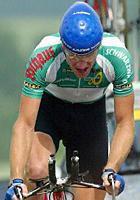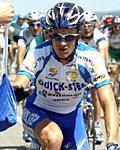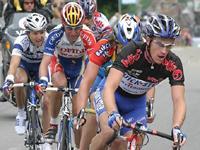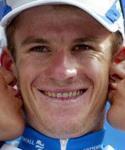
| Tour home |
| Preview |
| Photos |
| Live coverage |
| Start list |
| Stages & results |
| News |
| Map & profiles |
| Tour diaries |
| Features & tech |
| FAQ |
| Tour history |
Recently on Cyclingnews.com |
An interview with Michael Rogers - June 22, 2003
Rogers revives Quick-Step's season
The team that boasted a star-studded Classics line-up was found wanting in May, with results failing to match the expectations that the public, fans and sponsors demanded of it. It took a 23 year old, second-year pro from Canberra, Australia to rejuvenate Quick.Step-Davitamon with overall wins in the Tour of Belgium and Germany. The question now is, can Michael Rogers continue his spell of fortune and form in Paris two weeks from now? Anthony Tan thinks so.
Michael Rogers Born: December 20, 1979 Career highlights (1999-2003)2003 1st GC & Stage 6 TT, Tour of Germany 2002 1st GC & Stage 1, Tour Down Under 2001 2nd Stage 6, Redlands Classic 2000 1st Stage 2, Tour Down Under 1999 1st Road Time Trial, Ozzano Emilia Other stuff
|
THE LIFE OF A PROFESSIONAL CYCLIST IS PARTICULARLY REGIMENTED. A typical morning would consist of a strong cup of coffee together with a big breakfast, followed by a one hour delay for digestion, and then hopping on the bike for anywhere up to seven hours. Quiet time in the afternoon is not just important - it's virtually mandatory.
So when I'm confronted with a cacophony of background noise that sounds like a freight train and an overexcitable Chihuahua, I'm a little puzzled.
"Hey Michael, that doesn't sound like the best environment for a professional cyclist preparing for his first Tour de France! What's going on there?"
"That's not my dog," he chuckles. "I'm over at a friend's house and we're only 15 k's away from Malpensa Airport, so that probably explains the noise situation."
 |
One environment that does suit the Michael Rogers, however, is Quick.Step-Davitamon. At first glance, one would believe a quietly-spoken second-year professional from Australia's capital would have little opportunity to shine among a team of stars including Johan Museeuw, Frank Vandenbroucke, Paolo Bettini, Tom Boonen and Richard Virenque. Yet in 2003, quite the opposite has happened. Twice.
"I s'pose I was a little bit nervous, but I knew I had good legs and a good team behind me," says Rogers when retracing his incredible ride on the final stage of the Tour of Belgium. "I was probably nervous more because you need to know the roads in Belgium, but I had Johan Museeuw and [Frank] Vandenbroucke to help, who obviously grew up racing around here."
On a Liège-Bastogne-Liège style stage, Rogers kept his cool throughout the day, even when all his teammates save one were dropped on the climb of La Redoute with around 30 kilometres remaining. His previous directeur at Mapei, Luca Guercilena, and crafty boss Patrick Lefevere were still there though, shouting words of encouragement on the race radio and navigating Rogers to victory.
"We were using the radios a lot, communicating with the team car throughout the stage, so I knew when all the hills were coming and all the left and right turns," says Rogers.
But then something totally unexpected happened: Rogers flatted at the worst possible moment.
“If I have a good day, the yellow jersey might not be out of reach. ” |
"We had just gone over La Redoute, the bunch was in bits, and the team car was way behind," he remembers. "I thought it was all over."
Fortunately, teammate Jurgen Van Goolen was there to give Rogers his wheel, with Museeuw coming up from behind shortly afterwards, the Lion of Flanders powering their small group back to the front. The attacks continued all the way to the finish, with Rogers marking all apart from the last effort of Marlux rider Dave Bruylandts, who went clear on the final climb to Ans with two kilometres to go. But Rogers had done enough to secure his biggest win since his victory in the Tour Down Under and GP de Beauce in 2002.
Asked if he's done anything different training-wise this year, Rogers admits he went back to pumping iron at the gym - something he hasn't done since his days on the national junior track squad, where legendary track coach Charlie Walsh instilled a weight-training program for all his young disciples.
 |
"When I joined Mapei, I pretty much stopped going to the gym," he says. "This year, I was doing three or four sessions a week and a lot of base miles, and just worked out a really good program with the team; I started off a lot slower, but I improved each week, leaving my best form to start in Belgium and continue right through to the Tour de France. So now I am in my peak condition."
Rogers' second stage race victory at the Tour of Germany is testimony to that. But more significant was his win on the penultimate stage, a 40.7 kilometre time trial on a flat but technical parcours. The Canberra-born rider's closest competitor on the day was an in-form Jan Ullrich who conceded 1'10", with Rogers also beating other TT specialists including Laszlo Bodrogi, Michael Rich and prologue winner Fabian Cancellara. For this reason, he rates his win in Germany the biggest so far:
"I think for me, Germany was my biggest win because the time trial was there, and even though there was no Tour de France-style mountain stage, there were a few good climbs in there - especially on that day [stage 5] where ONCE took the first four places and I came fifth," he says.
It's easy to forget that Rogers is only in his second year as a professional. His demeanour on and off the bike displays a maturity beyond his 23 years - partly due to coming from a humble yet cycling-mad family, but more because of his upbringing under Walsh's and Shayne Bannan's track and road programs, where he learned just how far mind and body were willing to go.
"You learn a lot of things, not only about the bike, but about life and your body," says Rogers.
He then pauses somewhat unexpectedly, albeit just for a moment. As recollections of his days as a junior track rider come flooding back, it appears that Rogers' memories in the era of Walsh are not all viewed through rose-tinted glasses - he wasn't alone. "In the days of Charlie, it was a very hard program; we all pushed ourselves to the limit," he says, still with a tone of incredulity.
A slight hesitation also creeps in when we begin the topic of his first Tour de France. Rogers is a dark horse for the Paris prologue, and if he pulls it off, he'll be the first-ever Tour prologue winner from Australia - not to mention having the honour of donning the golden fleece in the world's greatest bike race.
 |
Says Rogers, "I really wanna see what I'm capable of doing in the prologue. If I have a good day, the yellow jersey might not be out of reach."
While they call the time trial the race of truth, the real test for Rogers lies later on; he knows that just to finish, he'll be making a massive leap in his physical development. Acknowledging that his team possesses no-one that can seriously challenge Armstrong (which team does?), Rogers says that most important for Quick.Step-Davitamon are stage wins.
"We're certainly capable of winning two or three stages", he says, "and we're quite a solid teams time trial team, so we'll definitely be searching to get some results."
What part Rogers plays in that role is yet to be seen, but if things keep going in the direction they have been, his passion and brilliance will surely pay dividends. And based on his performances to date, it's hardly surprising that he's already looking ahead to the month of October, where the world championship time trial will be fought on the roads of Hamilton, Ontario - on a parcours perfectly suited his abilities.
"It [the time trial] has long been a passion of mine," he says. "The circuit is a bit up and down and it's certainly not flat, which is perfect for me, so I don't think a top five is too out of reach."
Before you get the idea that Michael Rogers wants to become another Chris Boardman, think again: Rogers has already achieved what Boardman tried but failed to do - prove his worth on a mountain stage. He focus for the short to medium term will therefore be to realise his potential as a stage-racer and develop into a rider for the grand tours.
"My goal since I was seven years old was the Tour de France," he says. "If I can mould myself to be competitive in medium-ranked stage races, then slowly - very slowly - I may be able to develop into someone who can do a good result in a 21 day tour.
"Obviously, the Tour de France is another level, but having said that, on the right day, nothing's impossible."
Other Talking Cycling Interviews
|

